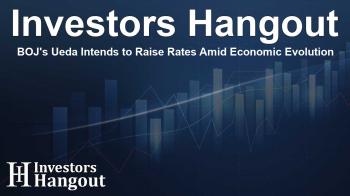BOJ's Ueda Intends to Raise Rates Amid Economic Evolution

BOJ's Commitment to Rate Increases
In a recent address, Kazuo Ueda, the Governor of the Bank of Japan, affirmed that the central bank is poised to further increase interest rates if the economic landscape continues on a positive trajectory. This declaration underscores the delicate balance faced by the BOJ as it navigates various economic risks while considering the timing of these adjustments.
Current Economic Climate
Ueda's remarks come on the heels of growing optimism regarding Japan's economic recovery. He highlighted that the BOJ's previous hesitation in raising rates was influenced by uncertainties surrounding international economic policies and domestic wage growth.
During a period marked by deflation, companies in Japan had opted to increase their dividends and intensify overseas investments. However, there has been a notable reluctance towards domestic investments and consumer spending; Prime Minister Shigeru Ishiba recently acknowledged this trend and committed to actions aimed at propelling the minimum wage and stimulating consumption.
Inflation Targets and Monetary Policy
Ueda expressed hope that last year’s upward momentum towards the central bank’s goal of attaining a stable 2% inflation rate will persist into 2025. He stated, "If economic and price conditions continue to improve, the BOJ will raise its policy rate accordingly," during a New Year’s event organized by banking representatives.
His comments reflect the BOJ’s ongoing evaluation of economic, financial, and price developments, along with a cautious approach to the potential risks that may influence monetary policy adjustments in the future.
Market Reactions and Predictions
The financial markets remain on alert following the BOJ’s decision to halt extensive monetary stimulus and the recent increase of interest rates to 0.25%. Investors are speculating about the timing of the next rate hike, particularly as the bank gears up for its upcoming meetings.
On the bond market front, the 10-year Japanese government bond yield recently increased by 3.5 basis points, reaching 1.125%—a level not seen in over 13 years. This rise in yields reflects expectations among investors for a potential near-term rate hike contingent on continued wage growth from Japanese firms, which saw a significant pay increase in 2024 amidst challenges such as decelerating global demand.
Implications of Wage Negotiations
In Japan, many large corporations typically engage in annual wage negotiations during March. However, Ueda noted that the BOJ is not strictly required to await these discussions before implementing rate changes, indicating flexibility in response to economic developments.
Furthermore, the BOJ is set to release its quarterly report on regional economies, which is anticipated to provide deeper insights into the central bank's perspective on wage increases. Additionally, the BOJ's Deputy Governor, Ryozo Himino, may offer further guidance on rate hike expectations in his upcoming speech and news conference.
Conclusions on Future Monetary Policy
As the Bank of Japan faces a complex economic landscape influenced by both domestic and global factors, the commitment from Governor Ueda to consider further rate hikes reflects a cautious optimism about the nation's recovery. Stakeholders remain attentive to wage negotiations and economic indicators that could catalyze further monetary policy adjustments.
Frequently Asked Questions
What is the Bank of Japan's current interest rate?
The current interest rate is set at 0.25% after the recent adjustments made by the Bank of Japan.
What factors influence the BOJ's decision to raise rates?
The BOJ considers domestic economic performance, wage increases, inflation rates, and external economic risks when deciding on rate adjustments.
Why are wage increases important for the BOJ?
Sustained wage increases are crucial as they support consumer spending and help the BOJ achieve its inflation target, thereby justifying interest rate hikes.
When are the annual wage negotiations typically held in Japan?
Large corporations in Japan usually conduct their annual wage negotiations around March.
What could signal a near-term rate hike by the BOJ?
Continued improvement in domestic economic conditions and significant wage negotiations outcomes are key signals that may prompt the BOJ to consider a rate hike.
About The Author
Contact Caleb Price privately here. Or send an email with ATTN: Caleb Price as the subject to contact@investorshangout.com.
About Investors Hangout
Investors Hangout is a leading online stock forum for financial discussion and learning, offering a wide range of free tools and resources. It draws in traders of all levels, who exchange market knowledge, investigate trading tactics, and keep an eye on industry developments in real time. Featuring financial articles, stock message boards, quotes, charts, company profiles, and live news updates. Through cooperative learning and a wealth of informational resources, it helps users from novices creating their first portfolios to experts honing their techniques. Join Investors Hangout today: https://investorshangout.com/
The content of this article is based on factual, publicly available information and does not represent legal, financial, or investment advice. Investors Hangout does not offer financial advice, and the author is not a licensed financial advisor. Consult a qualified advisor before making any financial or investment decisions based on this article. This article should not be considered advice to purchase, sell, or hold any securities or other investments. If any of the material provided here is inaccurate, please contact us for corrections.

